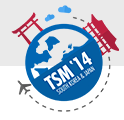1415T1g1 Silicon Valley/Course information
Silicon Valley region is the South Bay portion of Northern California. This is the home to many of the world’s largest technology company (Apple, Google, Intel, HP, Oracle, Facebook) and startups. It is also where most venture capital investments look to for technology startups.
Stanford University plays a major role in the creation of these technology companies. In search for the same influence, many universities, including CMU and NUS, stake a presence in this dynamic environment. TSM Silicon Valley is SMU’s answer to bring this experience and culture to our students in hope for catching the Valley virus and spurn our own startups.
Bill Gates thinks that half of Silicon Valley startups are ‘silly’. So, why do you want to visit whatever is brewing in the Valley? In the winter holiday? If your answer is to immerse in this experience to learn from the ‘silly’ founders, you are right for this TSM. Many people startup or reather start tinkering with ideas for the weirdest reasons. Let’s find a set of interesting start ups to visit together and have fun doing it.
Students are encouraged to take innovation and Technopreneurship related course.
This course will help
- Introduce students to the vibrant entrepreneurship scene in Silicon Valley.
- Develop an understanding of the factors leading to the proliferation of start-ups.
- Aspiring student entrepreneurs apply their findings to their own new venture journey.
- Students understand how and why entrepreneurs in South Korea were able to start up technology-based companies.
- Motivate and facilitate SMU students to start their own technology-based companies in other parts of Asia.
- Students explore Technopreneurship related internship opportunities with the companies that they visit.
Student teams will be assigned to different organizations.
Students will be assessed on both in class and during the trip activities and conduct. The grade break down and project descriptions are listed below.
The grade breakdown is listed below.
| No | Time Frame | Topics | Assessment Type | Weighting |
|---|---|---|---|---|
| 1 | Pre-Trip | Research on Organization | Team | 30% |
| 2 | Trip | Discussions | Individual | 30% |
| 3 | Post-Trip | Presentation (organization) | Individual & Team | 5% |
| 4 | All | Recommendations to the Organization | Team | 10% |
| 5 | Reflection | Individual | 25% |
Here are the assignments:
- In class presentations and wiki report
- Teams are to research on selected or assigned organization.
- Silicon Valley: background, industry, culture, ecosystem, research universities, compare to Singapore, politics, aspiration, etc.
- The culture/trait could be connections (companies, country, customer focus), support environment (government, business, infrastructure, society, market maturity, reputation), personality/company culture (integrity, leadership, competitive, entrepreneurship, savvy, creative, innovative, dynamic, risk taking, commitment to technology, excellent communication, team spirit, fun seeking, etc.). Research on this by reading books, websites or interviews. Come up with examples of company events when this trait is vital to the company. Explore this trait in some of the organization we will visit.
- Organization: background, motivation, challenges, investments/employee stock ownership plan/intellectual property, strategy/business model/IPO, culture/personalities/politics/connections, etc.
- Individual will be assessed based on the quality of your contributions in the role you play, getting organization, helping out with the trip planning and execution.
- Teams are to research on selected or assigned organization.
- During the trip
- Teams will ask questions, when the opportunity presents itself. Each team will introduce their company, present the focus and recommend improvements. Each team will have a backup team to support them (taking photos, questions, follow up, etc)
- Individual will keep a journal/blog/diary/tweet (with video, photo, links, etc.) on the discussion and visits. Focus on learning points and reflections. Compile your journal in the individual reflection page.
- Post trip Presentation
- Reflection on your research
- Key takeaways (2) or learning points from the organization
- Quotes from presenter/senior management/owner/founder
- Recommendation on how the trip can be improved further
All acts of academic dishonesty (including, but not limited to, plagiarism, cheating, fabrication, facilitation of acts of academic dishonesty by others, unauthorized possession of exam questions, or tampering with the academic work of other students) are serious offences. All work (whether oral or written) submitted for purposes of assessment must be the student’s own work. Penalties for violation of the policy range from zero marks for the component assessment to expulsion, depending on the nature of the offense.
When in doubt, students should consult the instructors of the course. Details on the SMU Code of Academic Integrity may be accessed at http://www.smuscd.org/resources.html.
There will be several classroom meetings to organize the course, trip and research. Students will meet in classroom to present their research findings. The teams are required to update their progress using the wiki.
Classroom: SIS SR 3.1 Thur 12:00-15:15
| Class (Week) | Topics | Comments |
|---|---|---|
| 1 | Course introduction, team formation and organization selection. Group photos. | Start individual and team wiki. |
| 2 | Preliminary contact to organization and trip planning | Start trip Itinerary |
| 6 | Get to know each other lunch. Update or confirm organizations. Continue trip planning | Wiki updates |
| Week 8: Break | ||
| 9 | Progress report. Continue trip planning. | Wiki updates and presentation |
| 12 | Trip briefing and internship. | Visa |
| 17 | Trip & presentation | Reflection complete |
